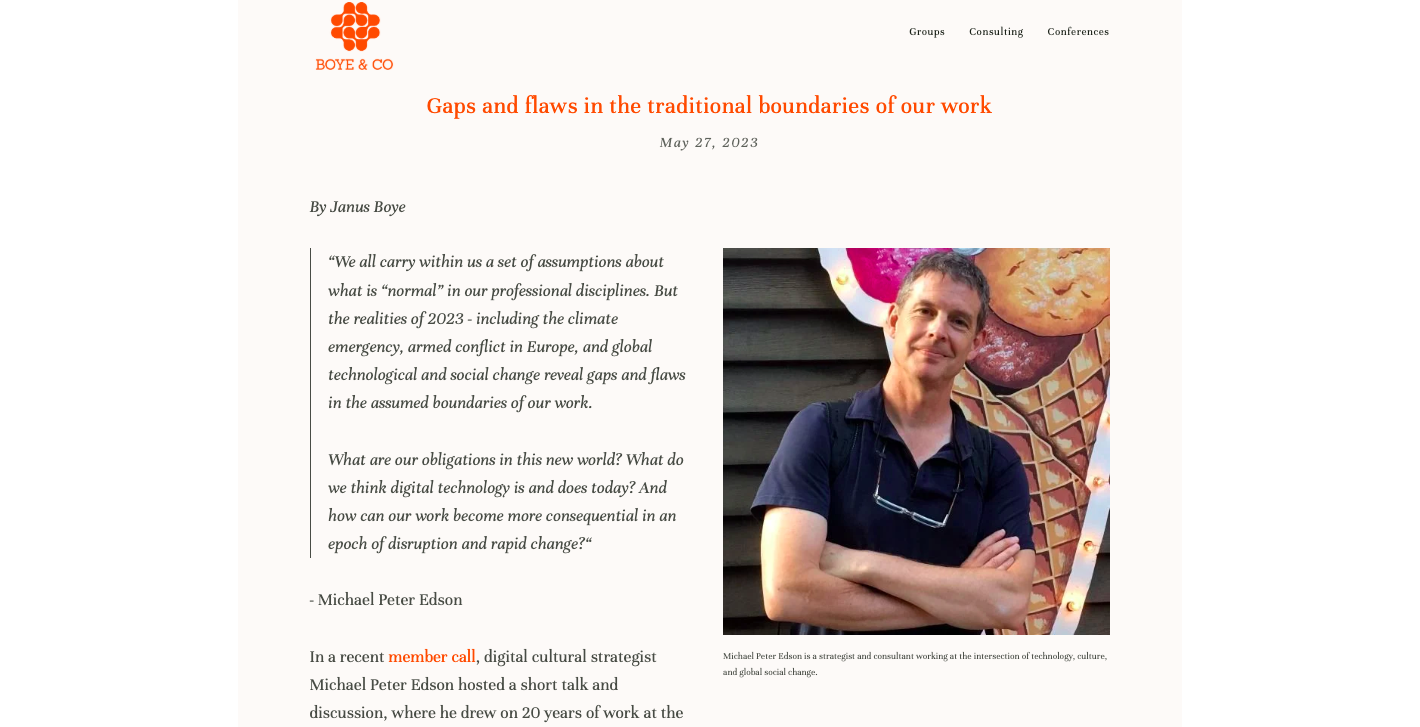I’ve just posted the report (slides here, and embedded above) from our climate-action strategy workshop Digital, Culture, and the Transformation of Europe, held on November 18-19, 2021 in Leiden, the Netherlands.
The goal of the workshop was to determine if, how, and to what degree the cultural sector (very broadly defined) can contribute meaningfully to the social, economic, and environmental transformations required by the climate emergency.
The word “culture” gets thrown around a lot in climate policy circles, and many of us, as cultural professionals, are outraged by the climate emergency and want to take action. But what can the cultural sector actually do for the climate fight?
Some clear themes emerged through our two-day workshop and the weeks of thinking and dialogue that followed. I’ll list a few below as a preview, as one does, but the depth and complexity of the ideas (and more) really come to life through the words of the participants themselves, as shown in the report.
The Big Frikin’ Wall — With a nod to the remarkable Kathy Sierra, much of the cultural sector seems afflicted by, metaphorically speaking, a Big Frikin’ Wall that stands between the world of safe, established practice and the world of urgent work that needs to be done. Working through, around, or over this wall will require a combination of strategic thinking, bold and enlightened management, well placed incentives. If we do not work through the Big Frikin’ Wall we are not likely to make significant progress on the climate emergency, as a sector or as a society. (See slide 38)
Local, bottom-up approaches — The importance of local, bottom-up action was a persistent theme throughout the workshop. Participants emphasized that they felt many organizations wanted to be more involved in campaigning, movement-making, and local action but don’t know how to start. Training in these techniques might be a smart investment for the sector. (See slide 56)
The role of culture — Participants offered a variety of opinions about the role of culture in society. Is “culture” a social good? A tool that serves power? An expression of identity? An entertainment medium? A tourist industry? A human right? The term culture is used in a variety of sometimes contradictory ways, even within the same sentence. A shared understanding of what we mean by “culture” would help us have more productive discussions about how to use it as a tool for positive change. (See slide 70)
Digitality — It is hard to imagine how we will win the climate fight without an enlightened and strategic use of digital platforms; and it is easy to imagine losing the climate fight if digital is ignored (or worse, subverted). But a concept of digitality — what it means to live in a society that is infused with digital — is notably absent from the cultural strategies emerging from initiatives such as the European Green Deal and the New European Bauhaus. The cultural sector must develop a concept of digitality to match its ambitions for participating in climate action or effecting social change. (See slide 69)
- - Note that I’ll be speaking about a new concept of digitality at Computers in Libraries and the MuseumNext Green Summit this month.
The need for solidarity — Workshop participant Tom Pravda, Co-founder of Avaaz, asserted that the social problems caused by the climate crisis may prove to be more of a problem than the climate crisis itself. “We need to be working in ways to build human solidarity — a sense that we are in this together,” stated Tom. “Only by cooperating are we going to be able to tackle this problem.” (See slide 17)
I am happy to say that a number of clear, actionable initiatives arose directly from this workshop, including a sector-wide training initiative, a proposal for Horizon Europe funding, and a radical “incentive prize” competition. These, in addition to the remarkable work already being done by workshop participants.
Concept development is underway for these new initiatives, and I’m also working to organize a follow-up meeting in Europe and similar workshops in the Americas, where the cultural-sector issues are different but the will to make a difference is likely to be the same.
Finally, as I’m writing this I’m aware that the COP26 conference in Glasgow was taking place as we were planning this workshop, and the IPCC’s grim sixth climate report was issued 2 days ago as I was finalizing the report. Meanwhile, the world is still afflicted by the COVID-19 pandemic and Russia has invaded Ukraine. If we believe that the cultural sector, however defined, has the potential to inspire and educate people, build solidarity, and transform lives for the better then there’s a lot of work to do.
Many thanks to everyone who participated (listed on slide 6), including our supporters and GoFundMe contributors who pitched in to defray travel and lodging expenses for participants. And of course many thanks to my co-conveners Meta Knol, Director of the Leiden 2022 European City of Science, and Harry Verwayen, Director of the Europeana Foundation, who stepped boldly into the void to help make this workshop a success.



















